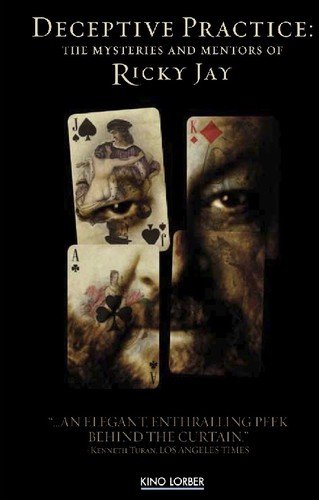
Written by Michael Nazarewycz
We like to do things big in America. We supersize our food. We drive Hummers. The Big Gulp is now the smallest of the Gulp line of beverages. We live in McMansions. We encourage Michael Bay.
Magic has fallen victim to the same bloat.
What was once an intimate art form has become a gaudy event, with every trickster more showman than magician, every assistant more stripper than confidante, and every illusion more spectacle than trick. Magic was once “look at this.” Now, it’s “look at me.” It wasn’t always this way.
A link to the past, a link to the time in magic’s history before craft became crass, is alive and well, and mesmerizing.
Ricky Jay, a sleight-of-hand legend, is the subject of Deceptive Practice: The Mysteries and Mentors of Ricky Jay, a documentary that is part biography, part history lesson, and part magic show, and each of those parts is the best part of the area it represents. The film chronicles the life of Ricky Jay (born Richard Jay Potash) the Magician, not Ricky Jay the Person (with limited exception, his private life is not on display); nor Ricky Jay the Actor (there are clips of his appearances in films, but not as part of his career timeline – the clips are really only used as B-roll behind the narration); nor Ricky Jay the Author, the Magic Historian and Collector, the Gambling Expert, nor the Hollywood Consultant.
And by the end of the film you realize that this is a deliberate choice, as the content of the documentary is representative of Jay himself: focused on magic. Yes, there are those other facets of Jay’s life, but they are minor footnotes by comparison. The decision also reinforces that this film isn’t some vanity project that screams “now that I’m famous and old let me tell you all about me,” and it never needs to be, because the life of Jay the Magician’s is so full and rich that there is plenty of material to easily sustain the 89-minute running time. (Of course, ever the Magician, Jay is only really showing you what he wants you to see.)
The structure of the film is a fairly straight chronology of Jay’s Magician’s life, beginning with his first magic gig (at age 4!) and ending somewhere around present day. The film is narrated by the subject himself in a style that feels mostly unscripted; in fact, Jay frames the narrative of his Magician’s life by telling stories about, and heaping great praise upon, the men who had such considerable influence on him. It’s as if he himself is some great compilation of them, and his memory of them is unabashedly reverent. Those men include his grandfather, Max Katz, a professional accountant and amateur magician who introduced Jay to the craft, as well as professional magicians like Cardini, Slydini, Charles Miller, and Dai Vernon.
Who? Exactly. This is yet another fascinating part of the film – the introduction to sleight-of-hand masters who many have never heard of. And this style of magic is such a pure subject for Jay, the name just about everyone knows – Houdini – is mentioned only once in the film, and even that was only as part of a clip of one of Jay’s stage shows. That’s not to suggest that Houdini was not important in the history of magic; he was. But it suggests that Houdini was a precursor to the celebrity magicians of today, and celebrity, despite Jay’s success and fame, is not what he or his craft are about.
Other entries of note in the film include clips from Jay’s appearances on 1970s talk shows (think Dinah Shore); additional narration by the legendary Dick Cavett; and guest appearances by people who are close to Jay and who contribute to the telling of his life’s tale, including two-time Oscar nominee David Mamet, who directed three of Jay’s stage productions: Ricky Jay and His 52 Assistants; Ricky Jay: On the Stem; and Ricky Jay: A Rogue’s Gallery.
But the ultimate highlight of the film is the collection of clips with Jay masterfully manipulating a deck of cards. His sleight-of-hand skills are so good, you cannot take your eyes off his hands, and yet you can never tell what he’s just done with that deck in those hands that you never stopped looking at. I had the privilege of screening this film on DVD, and I can assure you I stopped, rewound, slo-mo’d, and so on, and still I couldn’t see the moves he made to make the tricks he pulled so spectacular.
Ricky Jay is one of those people we envy not necessarily for his specific skills, but for the good fortune he had when he found the thing that he would one day be great at. Ricky Jay is Michael Jordan. Ricky Jay is Jack Nicklaus. Ricky Jay is Wayne Gretzky and Steven Spielberg and Frank Sinatra and Oprah Winfrey and every other person who ever became the best in their field for an extended period of time. And what works so well here is that the film tells you that without ever having to actually say it.
It’s fitting that this film, which premiered at the 50th New York Film Festival in 2012, is being released in select theaters across the country now. It was only two months ago that the comedy flop The Incredible Burt Wonderstone was playing in multiplexes, and we are only weeks away from the release of the anticipated thriller Now You See Me. Each of these films, with all-star casts and themes celebrating magic-as-spectacle, is the antithesis of Deceptive Practice: The Mysteries and Mentors of Ricky Jay, and no matter how good or bad each is, Jay’s film is the perfect, intimate antidote to the go-big-or-go-home spectacle of Hollywood magic-making.